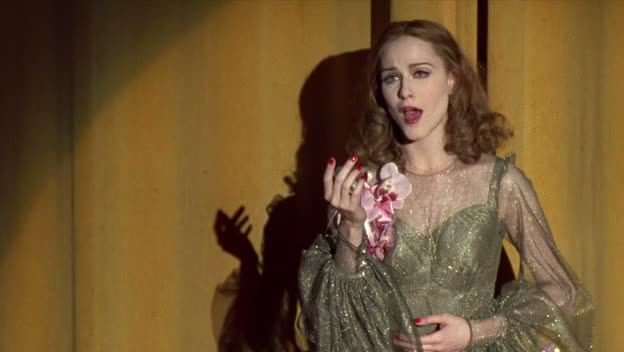
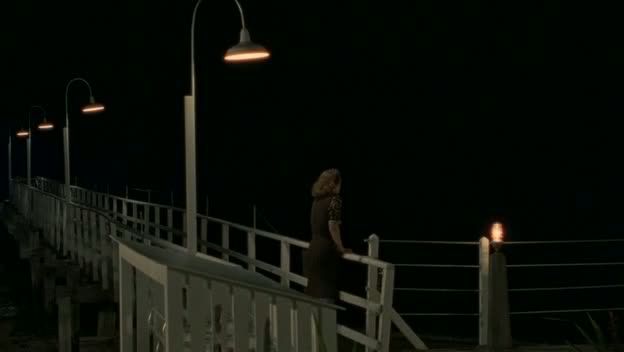
episodes 1-2 | episode 3 | episodes 4-5
In the final two episodes of Todd Haynes' HBO miniseries Mildred Pierce, the story leaps forward in time several years after the previous episode ended with a decisive break between Mildred (Kate Winslet) and her high society lover Monty Beragon (Guy Pearce). In the ensuing years, Mildred's business has flourished and expanded, and she now has two additional restaurants as a part of her empire, run by her friends. Mildred's daughter Veda has grown up, too, a detail that Haynes lovingly lingers over during the early scene where Mildred returns home to find Veda playing the piano in the living room. The girl is only seen from behind at first, as Haynes' camera glides through the house, following Mildred as she putters about, the images recalling the scenes from earlier episodes of Veda practicing her piano. But this is not the snotty little brat of the first three parts of the series, this is Veda all grown up into a predatory diva, played by Evan Rachel Wood. And just as she was as a child, Veda is still the center of Mildred's life, the whole reason for her existence. Throughout these often devastating, potent final two and a half hours of the miniseries, Veda's dominance of Mildred's life becomes the focus of the film as well, and in the process it begins to seem like Haynes is critiquing the foundations of motherhood itself.
Mildred's story, after all, is the story of the costs of motherhood. Again and again, Mildred sacrifices everything for Veda. At a certain point, after a tremendous argument, Veda moves out of her mother's home, and Mildred spends the rest of her time trying to get her daughter back, trying to win the affection of this girl who is very appropriately compared to a rare and beautiful — but deadly — snake. Mildred allows her business to flounder, her attention wavering from her previous single-minded dedication to having a prosperous career. The whole reason for her business in the first place was to impress Veda, to be able to provide for Veda, and with Veda gone Mildred no longer seems like the strong, determined businesswoman that she once was.
Mildred also gets back together with Monty after randomly encountering him on a street corner, waiting for a bus — he's "between cars," he says, maintaining his high society composure even now that his fortunes have fallen even further. Their relationship initially seems like an improved version of their original fling. The passion is there, and Mildred's desire for Monty is reawakened once she's back in his presence. There's real if unlikely chemistry between them, and Haynes uses it as an opportunity for another very lurid sex scene: it's not often that one sees a shot of a man's head buried between a woman's legs in a staid period picture. The couple gets married, and Monty seems to have changed in substantial ways from his earlier affair with Mildred. In a key scene for his character, he shows Mildred a room he's arranged for her, decorated with mementos of her daughter and her restaurant; he delivers a moving and seemingly sincere speech about how much he admires rooms that reveal something of their owners, rooms where each object means something to those who inhabit them, and he expresses a wish to make this kind of life with Mildred. It's a very touching moment, and a genuine one, a moment that suggests that Monty has matured, that he really wants to create that happy, meaningful life with Mildred.
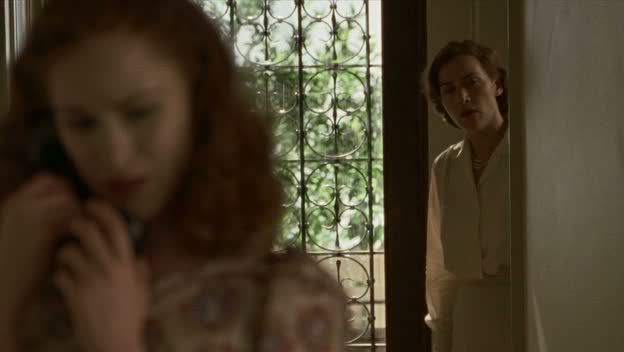
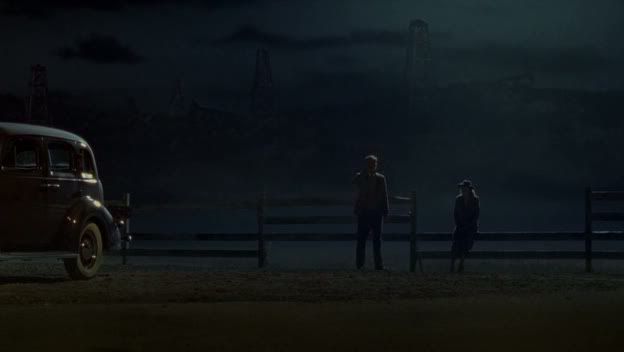
That touching moment of potential with Monty, the moment when it briefly seems as though a happy ending might actually be possible for this improbable couple, lingers over the remainder of the film, and makes what happens subsequently even more heartbreaking. Once Veda is back in Mildred's life, it's as though Monty has served his purpose, just as the business has served its purpose, and Mildred ignores each of them more and more. Mildred begins to seem less like the strong independent woman she had once been and more like a overbearing mother who's living through her daughter's life and accomplishments. In one scene, Monty tells Mildred that he'll be sleeping alone, leaving her to stay up late with Veda, and Mildred jokes, "I guess we're just middle-aged," but as Monty walks away down a long, shadowy hallway, shrouded in darkness, it seems obvious that he's not so flippant about his increasing (and rapid) marginalization in this marriage.
Mildred, however, seems more concerned with her daughter, since as Mildred calculated, Veda returns to her mother's life after the marriage, lured by the society wedding and the newly redecorated Pasadena mansion, so remote from the suburban Glendale mediocrity that Veda so despised as a girl. Veda, during her time away from home, has somewhat improbably become a classical opera singer after failing as a pianist, finally displaying the talent that Mildred had always sensed was in the girl. When Mildred first hears Veda sing, she's with Bert, listening to the radio, and Haynes' camera circles around the radio, focusing on the speaker and the sound mysteriously emanating from it, emphasizing the strange disconnection of this moment, the way Veda's voice emerges from the ether, the daughter who Mildred so desperately needs and hasn't seen in months suddenly crying and howling from the radio in airy, high-pitched trills. It becomes too much for Mildred: she walks away, standing by a dock in a composition that echoes a similar one from the 1945 Joan Crawford version of Mildred Pierce, although for Haynes it's not a melodramatic moment of near-suicide but a quiet interlude of contemplation.
Later, in the miniseries' biggest set piece, Mildred, Bert and Monty go to see Veda perform at the Philharmonic, a grand debut that Mildred watches with an expression somewhere between incomprehension and terror. She doesn't even look happy; she looks like she's watching a horror movie, on the verge of tears, over-awed by her daughter's talent, unable to understand how these sounds are emanating from her longtime object of fixation. At one point, Mildred borrows a pair of opera glasses, and Haynes inserts a shot of the view through the binoculars, magnifying Veda's face to reveal the sneering, angry expressions on her face as she sings, as though she's pulling her voice up from some deep, dark place within her, expressing her rage through these beautiful but demanding songs. Mildred looks away almost immediately, unable to deal with that, and she much prefers the encore when Veda unexpectedly sings a song that's implicitly meant for her mother, a song she knows her mother loves, and ends it by blowing a kiss. It's a tender gesture that might also be a sarcastic one, prefaced by an acknowledgment that she knows her mother's song doesn't belong on a Philharmonic program, just as she knows that her mother doesn't belong in the upper class.
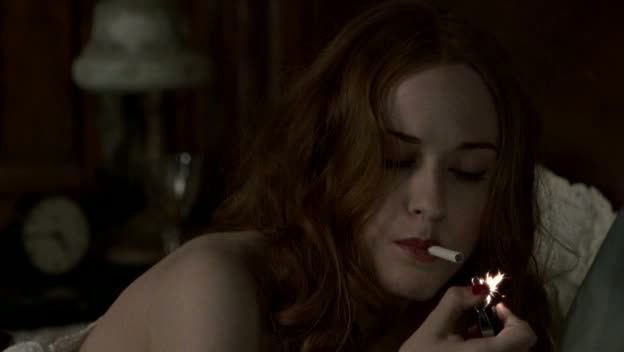
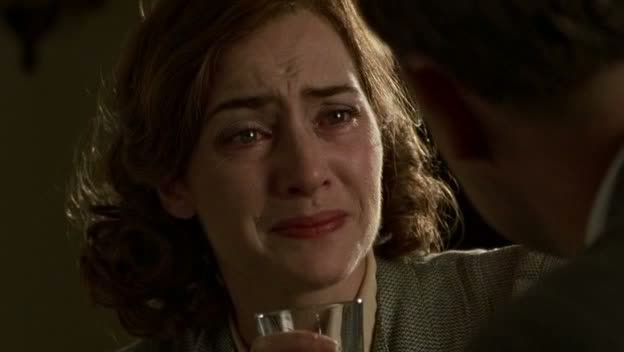
All of this sets the stage for the harrowing and unforgettable climactic scene, a masterpiece of staging, in which Mildred finds Veda and Monty in bed together. Haynes really lets the long-bubbling Freudian psychosexual subtexts come raging to the surface at this point, as Mildred slumps against the wall, her mouth slack, her eyes disbelieving and wide, looking at her daughter languidly stretched out naked in bed. Wood's performance is at its over-the-top best here, cutting loose with this chilly girl's sneering, sinister slinkiness. As her mother breaks down in shock and Monty quickly recovers his suave act, Veda becomes downright evil, the full flowering of the nasty, self-motivated, manipulative evil that had shown up in flashes previously but is really unleashed here. She casually lights and smokes a cigarette, lying in bed, the blankets loosely draped over her, falling off her shoulders, smiling her cold smile. And then, in a moment of transcendent horror, she gets up out of the bed, deliberately allowing the blankets to fall away from her long, thin — snakelike — body, and walks naked across the room, parading her body in front of her mother, then sits in front of the mirror, still nude, combing her hair. It's an eerie, dreamlike scene, a nightmare in the flesh. Veda is provoking her mother, displaying herself to her, and the moment resonates with the earlier one in which Mildred had given her sleeping daughter a kiss on the lips that was more sapphic than motherly. This bedroom confrontation is a chilling, provocative sequence, a scene of high gothic melodrama that, in retrospect, Haynes' entire series was building towards.
That's the emotional crescendo of the entire miniseries, and it's very powerful, deliberately upstaging the staid, censorship-bound similar scene in the 1945 Hollywood Mildred Pierce. Haynes, sticking close to the James M. Cain source novel, avoids the murder mystery genre plotting from the Joan Crawford movie, but his film's climax is even more lurid, even more melodramatic, rising to operatic excesses to stage this horrific primal scene. The whole sequence ends with another striking composition, after Mildred has choked Veda, straining the girl's singing voice. Veda runs downstairs, clothed now only in a thin silk robe, staggers to the piano, crouches on the bench to bang out a few discordant notes, croaking awfully, then collapses to the ground beside a puddle of her own vomit. Haynes holds the terrible, emotionally devastating, ugly moment in a long shot, encompassing the shadowy high-ceilinged room with Veda collapsed in the background, Mildred standing in the middleground, and Monty in the foreground looking on in shock. It's a harrowing moment, and contrasted against the meticulous period detail and quotidian reality that dominate the rest of the series, it's as though Mildred has suddenly been plunged into an abyss, hurtling out of her average suburban lifestyle into a psychosexual nightmare.
Following this scene, Mildred has nowhere to go but back into the comforting arms of her first husband, Bert (Brian O'Byrne), and the ordinary suburban existence they once enjoyed. She flees from her daughter, from her business ambitions, from her social climbing rise into the upper class, and returns to boring, prosaic Glendale and the boring, prosaic marriage she'd once fled. The Hollywood film played this marital reconciliation as a happy ending, if a perfunctory one, but Haynes allows the full impact of this turn of events to resonate. It all ends with Bert's hollow insistence that everything will be alright, that they've got each other, and all the while there's such earnest desperation in his face, in the way he urgently pours two glasses of liquor for them. "Let's get stinko," he says, and Mildred repeats it for the last line of the film. And then she shoots the camera a gaze of such teary, red-eyed despair that it becomes instantly apparent that things are not alright, that this is not a Hollywood happy ending, that this couple has got years of drunken denial and disconnection still ahead of them.







0Awesome Comments!